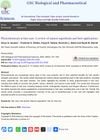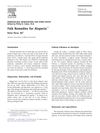September 2020 in “Eureka: Health Sciences” The emulgel with specific ingredients was effective for treating hair loss.
27 citations,
January 1995 Melanin in black hair protects it from sun damage better than light-brown hair.
10 citations,
March 2005 in “International Journal of Cosmetic Science” Oxidation changes human hair by breaking down fats and forming new acidic groups, affecting how it interacts with conditioners and cosmetics.
[object Object]  November 2024 in “GSC Biological and Pharmaceutical Sciences”
November 2024 in “GSC Biological and Pharmaceutical Sciences” Phytochemicals from plants can improve hair growth, strength, and scalp health.
April 2020 in “The FASEB journal” Poncirin is a promising inhibitor of Janus Kinase 3, potentially better than tofacitinib.
 January 2024 in “Natural product research”
January 2024 in “Natural product research” The bulb and shoot of Allium longisepalum contain various compounds with potential health benefits, including antioxidant and anti-inflammatory properties.
January 2015 in “Современные проблемы науки и образования” Phytochemicals in hair masks can help with damaged hair, seborrhea, and hair loss.
317 citations,
April 2018 in “Journal of steroid biochemistry and molecular biology/The Journal of steroid biochemistry and molecular biology” PCOS is a complex condition in women that can lead to health issues, and lifestyle changes are the best management approach.
 12 citations,
November 2017 in “Archives of Dermatological Research”
12 citations,
November 2017 in “Archives of Dermatological Research” Mediterranean diet with fresh herbs and vegetables lowers male hair loss risk.
1 citations,
December 2021 in “Natural Product Research” β-sitosterol and brassicasterol may help treat hair loss.
 1 citations,
May 2019 in “Frontiers in Pharmacology”
1 citations,
May 2019 in “Frontiers in Pharmacology” The book provides detailed information on natural ingredients in beauty products and emphasizes the need for more human trials to confirm their effectiveness.
 1 citations,
June 2013 in “Clinics in dermatology”
1 citations,
June 2013 in “Clinics in dermatology” Herbs may be safer and effective for treating hair loss.
1 citations,
January 2012 in “Hair therapy & transplantation” New natural hair loss treatments seem safer but need more research.
 June 2024 in “JURNAL PENDIDIKAN DAN KELUARGA”
June 2024 in “JURNAL PENDIDIKAN DAN KELUARGA” Celery extract can be used as a natural hair tonic for treating hair loss.

Cosmeceuticals can improve skin health and appearance but need more research for safety and effectiveness.
[object Object]  January 2024 in “Journal of Ayurveda and integrative medicine”
January 2024 in “Journal of Ayurveda and integrative medicine” Millets may help reduce chemotherapy side effects like nausea, fatigue, and hair loss.
May 2023 in “Journal of Drugs in Dermatology” REVIVV® serum improves hair growth and reduces shedding in androgenetic alopecia.
April 2011 in “Journal of Medicinal Plants Research” Ocimum basilicum L. and red Oryza sativa L. may help with hair loss and prostate issues.
March 2007 in “International Journal of Cosmetic Science” Hair with more melanin resists weather damage better.
March 2005 in “Journal of the American Academy of Dermatology” Adding amino acids to damaged hair can improve its strength and appearance.
 20 citations,
February 2013 in “Nutrition”
20 citations,
February 2013 in “Nutrition” Selenium-enriched green tea might be a safe prebiotic for gut health.
Eclipta alba Linn. is effective for various health issues and promotes hair growth.
10 citations,
September 2022 in “Journal of Biophotonics” Blue light therapy is safe for skin and may protect against UV radiation.
7 citations,
January 2001 in “Comprehensive series in photosciences” UV radiation significantly damages hair, especially with humidity, making it more vulnerable to further damage.
5 citations,
October 2003 in “PubMed” Chemical treatments and light exposure damage hair proteins.
2 citations,
January 2014 in “Photochemical & photobiological sciences” Grasp protein helps maintain skin health after UVB exposure.
 4 citations,
April 2018 in “Journal of Investigative Dermatology”
4 citations,
April 2018 in “Journal of Investigative Dermatology” Hydroxypinacolone retinoate is a potent anti-aging ingredient for skin that is more effective and less irritating than other forms of retinoids.
 1 citations,
April 2018 in “Journal of Investigative Dermatology”
1 citations,
April 2018 in “Journal of Investigative Dermatology” Fzd2 is important for skin and hair development through various signaling ways.
 April 2018 in “Journal of Investigative Dermatology”
April 2018 in “Journal of Investigative Dermatology” Older hair follicle stem cells have a reduced ability to renew themselves, leading to more hair loss.
 April 2018 in “Journal of Investigative Dermatology”
April 2018 in “Journal of Investigative Dermatology” Both Th1 and Th2 immune responses are increased in alopecia areata, with Th2 response more strongly linked to how severe the disease is.












